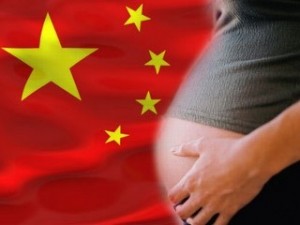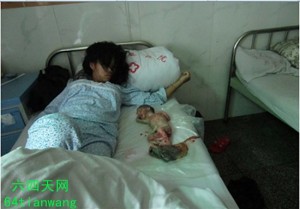Feng Jianmei: The Unanticipated Impact of One Forced-Abortion
 One of the general sessions at this summer’s 2012 NRLC national convention was aglow with energy and alight with enthusiasm. You could feel a powerful swelling of emotions as pro-life champion Rep. Chris Smith (R-NJ) and Reggie Littlejohn, president of Women’s Rights Without Frontiers, roused their audience at a session titled, “Where Are All the Girls? The Social Consequences of China’s One-Child Policy.”
One of the general sessions at this summer’s 2012 NRLC national convention was aglow with energy and alight with enthusiasm. You could feel a powerful swelling of emotions as pro-life champion Rep. Chris Smith (R-NJ) and Reggie Littlejohn, president of Women’s Rights Without Frontiers, roused their audience at a session titled, “Where Are All the Girls? The Social Consequences of China’s One-Child Policy.”
Afterwards, I talked with a number of people who shared the same conclusion I had drawn in listening to these eloquent, fiery speakers. And that is, that as monstrous as China’s “One-Child Policy” is, as seemingly entrenched as this grotesque mockery of human rights might appear, we have reason to hope that there may be an end to it sooner than we would have anticipated only a year or two ago.
There are a host of reasons, for this optimism, chief among them being the incredible bravery of people such as human rights activist Chen Guangcheng. A blind, self-taught lawyer, Chen garnered international attention in 2005 when he exposed how local officials were forcing women to undergo abortions and sterilizations to comply with China’s one-child policy. There were as many as 130,000 involuntary abortions and sterilizations being performed in Linyi County in a single year. Chen was sentenced to over four years in prison on trumped up charges, and when released was subject to house arrest for 19 months. Chen escaped and eventually was allowed to come to the United States with his wife and children.
Then there is the invaluable work of Rep. Smith, Ms. Littlejohn, and other organizations such as All Girls Allowed which are dedicated to ending a policy that is built on forced abortion. While others sleep or consider forced abortion and forced sterilization in China “none of our business,” they raise high the banner of justice.
It would difficult—make that impossible–to exaggerate the impact of Feng Jianmei’s forced abortion. Why this one, and not the millions of other families who could not pay the fine to have a second child? After all Feng’s baby was not the first to be aborted at seven months. Many are aborted much later in pregnancy.
The difference is her brave husband, Deng Jiyuan, who took photos of his wife lying next to the body of their baby and distributed them over the Chinese equivalent of Twitter. If ever I doubted, for even a moment, the power of social media, it ended with the outrage that ensued. Even the totalitarians that run China have at least gone through the motions of expressing regret for kidnapping Feng and brutally aborting her baby.
Even NPR—National Public Radio!—ran a piece on Feng and Deng and their baby under the headline, “After a Forced Abortion, A Roaring Debate In China.” It missed the boat on a number of elements, but at least they covered the atrocity. And if you read the resolution passed by the European Parliament openly condemning forced abortion and gendercide in China, it is clear Feng’s forced abortion played a major role. (See www.europarl.europa.eu/sides/getDoc.do?type=MOTION&reference=P7-RC-2012-388&language=EN.)
One other example, while perhaps not as dramatic, is still symbolic of the mounting opposition. Recently, the Wall Street Journal ran a story about Chinese novelist Sheng Keyi, written by Clarissa Sebag-Montefiore. An upcoming star literary novelist Ms. Shen pursued work in Shenzhen in the early 1990s and wound up working in a “birth control center.” Sebag-Montefiore writes
“While she was on staff, Ms. Sheng witnessed a forced abortion, as a young girl was hauled into the operating room by four men. ‘I was a propagandist, promoting knowledge on birth control. [Now] I write about the opposite to what I did—because I think the opposite is real.’”
The protagonist in her novel, “Northern Lights,” is mistaken for a married woman with children and she is forcibly sterilized, left “neutered like an old sow” at the age of 19.” Sebag-Montefiore writes
“The novel’s translation and re-publication is timely. Last month, graphic photographs of a woman lying next to a seven-month-old bloodstained fetus went viral online. Feng Jianmei, 23, could not afford to pay a $6,400 fine for the right to give birth to her second child. Family planning officials in Shaanxi province abducted her while her husband was away, beat her, blindfolded her, and— after administrating a lethal injection to her stomach—induced a still-birth. This savage treatment made news headlines world-wide and forced officials to apologize to Ms. Feng.
“’In a civilized society, such inhumane, barbaric and border-line murder cases like forced abortion shouldn’t exist,’ Ms. Sheng exclaims emphatically when asked about this case. ‘The Internet has put forced abortions into the spotlight, yet there are so many brutal incidents out of sight.’
“In 2008, more than nine million women in China had abortions, according to the Ministry of Health. Since 1979, when the one-child policy came into force, the government claims to have prevented more than 400 million births. …The gynecology ward in the average Shenzhen hospital was the most profitable of all. ‘The drains in the city are filled with blood,’ she says.”
All this and much more is like a tidal wave of resistance smashing against one of the most hideous assaults on human rights imaginable. And it IS making a difference.
As Chai Ling, founder of All Girls Allowed, said following the resolution from the European Parliament, “The day is coming when China will no longer lose its infant girls and brutalize its mothers because of a policy that harms the nation.” She added, “It’s time for the one-child policy to end.”


